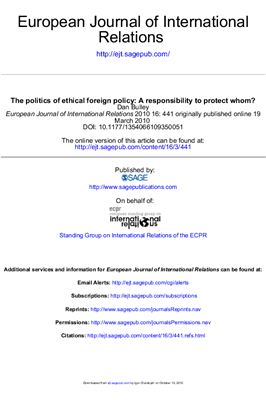// European Joual of Inteational Relations. – vol
.16. – 2010. – №
3. – P. 441–461.
Abstract
Ethical foreign policy persists as a problem of inteational relations, especially regarding humanitarian intervention. However, despite apparent inteational upheavals, the debate about the ethics of humanitarian intervention has remained fundamentally unchanged. To escape the limits of this debate, this article deconstructs British claims to ethical foreign policy since 1997, reading these claims against themselves and against contemporary humanitarian intervention literature. It finds that Britain’s ethical framework, the ‘doctrine of inteational community’, which justifies interventions in Kosovo, Sierra Leone and Afghanistan, is undone by the anomalous, yet exemplary, invasion of Iraq.
This demonstrates the politics of ethical foreign policy: first, that any intervention, no matter how ‘ethical’ or ‘right’, produces suffering and death; and, second, that we cannot know for sure whether we are doing the right thing by intervening. Embracing, rather than effacing, the political nature of ethical foreign policy opens up a more intellectually honest and positive potential future for relating to the foreign in a responsible manner.
.16. – 2010. – №
3. – P. 441–461.
Abstract
Ethical foreign policy persists as a problem of inteational relations, especially regarding humanitarian intervention. However, despite apparent inteational upheavals, the debate about the ethics of humanitarian intervention has remained fundamentally unchanged. To escape the limits of this debate, this article deconstructs British claims to ethical foreign policy since 1997, reading these claims against themselves and against contemporary humanitarian intervention literature. It finds that Britain’s ethical framework, the ‘doctrine of inteational community’, which justifies interventions in Kosovo, Sierra Leone and Afghanistan, is undone by the anomalous, yet exemplary, invasion of Iraq.
This demonstrates the politics of ethical foreign policy: first, that any intervention, no matter how ‘ethical’ or ‘right’, produces suffering and death; and, second, that we cannot know for sure whether we are doing the right thing by intervening. Embracing, rather than effacing, the political nature of ethical foreign policy opens up a more intellectually honest and positive potential future for relating to the foreign in a responsible manner.

